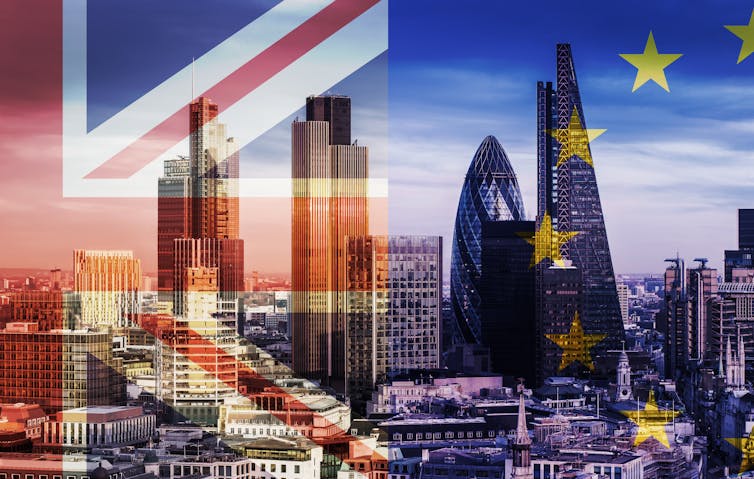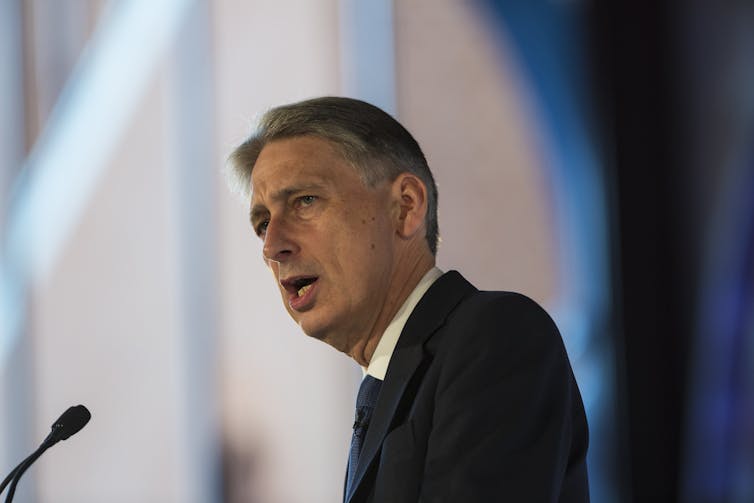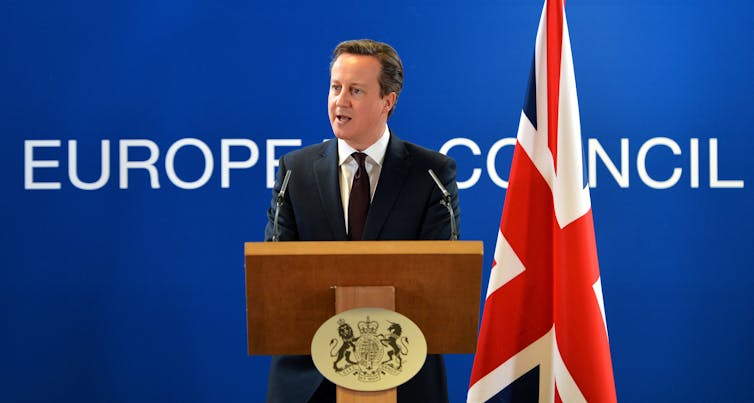Brexit: why Britain's hopes for a special financial services deal are set to be dashed

The spectre of Brexit hangs over the City of London. shutterstock.com
Courtesy of Ioannis Glinavos, University of Westminster
Philip Hammond, the UK chancellor of the exchequer, has the challenging job of crafting the best possible deal for the City of London after Brexit. The City is the home of the financial services industry which makes up 10% of the UK economy and is one of the few areas that the UK has a trade surplus with the EU. Hammond wants to ensure both the continuation of business with Europe and preserve those attributes that made the City a global centre for finance.
It is therefore surprising that in a speech outlining the UK’s position on financial services and Brexit, Hammond confirmed what the prime minister, Theresa May, has said repeatedly: the UK will depart the EU single market. Instead, he wants to secure a special trade deal with the EU that includes financial services.

Hammond wants a trade deal with the EU that includes financial services. Chatham House, CC BY
Meanwhile, the EU has made its stance clear: if the UK leaves the EU single market, it cannot “cherry pick” certain sectors of the single market for a deal. It will have to accept a more orthodox free-trade agreement, similar to a Canada-style trade pact. This means losing the passporting rights that allow firms to have branches across the EU from a UK base. And it is this unfettered access to the EU market that has drawn a number of financial firms to set up base in the UK.
The gateway to Europe
Let us consider the position of a non-EU bank that was attracted to London due to its much-advertised position as the gateway to European finance at the beginning of the 2010s (before the Conservative Party campaigned in the 2015 election on a manifesto promising a referendum on EU exit). London was advertised as providing companies with easy access to the markets of the European Economic Area (EEA).
In a speech to financial bigwigs in 2010, then prime minister, David Cameron, summed this up with the declaration:
We sit at the heart of the world’s most powerful institutions … We are strong and active members of the European Union, the gateway to the world’s largest single market.
Cameron was proud to show how Britain was an important European partner, using its membership of the EU to defend and advance UK interests. To this end, he promised: “We will stand up, at each and every turn, for our financial services industry and the City of London.”
London was the leading location for European headquarters. Its unrivalled access to markets, as well as talent and cultural diversity gave it an edge against competing cities. And it was a robust hub in the uncertain post-financial crisis landscape, while the eurozone struggled in comparison.

Back when the UK had a say in shaping EU policy. Number 10, CC BY-NC-ND
The main mechanism through which financial firms benefited from being based in London was through the EU financial passport. This passport permits financial services companies based and regulated in one country of the EU (or the broader EEA), and authorised under one of the EU’s single market directives, to do business in other member states purely on the basis of their home state authorisation.
By losing its place in the single market, London can no longer guarantee access to the world’s biggest consumer market of nearly 500m people.
Brexit also threatens the City’s access to talent. London has offered companies a huge specialist financial workforce and this has underpinned its success as a hub. But surveys show that many non-British workers are considering leaving in the next five years and high-skilled EU workers are the most likely to leave (as many as 46%) – because the UK is now perceived as hostile to foreigners.
The firms that crossed the Atlantic to set up shop in the City will not see this as a gain. Not only will they see it as a loss, they will ring their lawyers to ask for options regarding compensation for the potential loss of earnings that they can blame on Brexit.
Next steps
Equivalence might be the UK’s only hope. This is where the EU grants market access to countries that show their financial sector regulation to be as tough as that of Europe. It has not been ruled out as an option by either side. But the rights it would secure do not match that of the passport and it would depend on significant goodwill from the EU.
Even if equivalence were possible, it begs the question of whether this would be enough to placate frustrated bankers. This is, after all, how American and Japanese firms access the EU.
The obvious way to compensate firms for the upset would be through Singapore-style tax and regulation incentives to keep them. But Hammond has promised not to do this – and it is a minimum requirement of the EU’s new draft of trade negotiation guidelines, which offers a limited trade deal on the condition that the UK will not undercut the EU’s economy in this way.
![]() So the thing that Hammond needs to drop to secure a deal with Europe is precisely what the industry is hoping to get as compensation for losing the passport. The chancellor therefore faces an impossible conundrum. Choosing a non-single-market Brexit can only be sweetened by eyeing Singapore, yet Singapore risks the total severance of links with Europe. There are no good options here.
So the thing that Hammond needs to drop to secure a deal with Europe is precisely what the industry is hoping to get as compensation for losing the passport. The chancellor therefore faces an impossible conundrum. Choosing a non-single-market Brexit can only be sweetened by eyeing Singapore, yet Singapore risks the total severance of links with Europe. There are no good options here.
Ioannis Glinavos, Senior Lecturer in Law, University of Westminster
This article was originally published on The Conversation. Read the original article.



